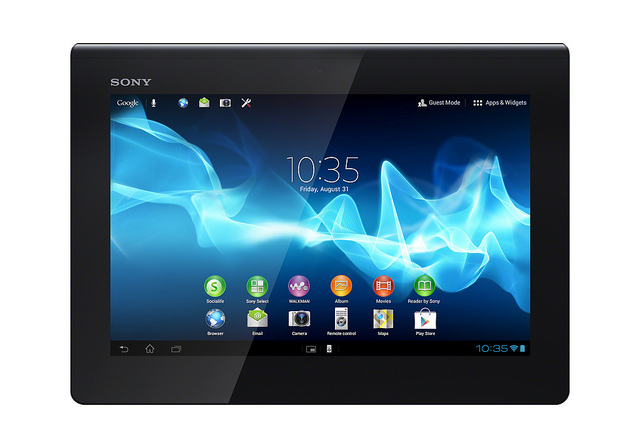 As the popularity of tablets continues to grow, instructors are beginning to experiment with ways to use education-based applications in their classrooms. There are thousands of applications available for both iPad and Android users, but for this article, we selected five Android apps we believe are especially useful to faculty in higher education.
As the popularity of tablets continues to grow, instructors are beginning to experiment with ways to use education-based applications in their classrooms. There are thousands of applications available for both iPad and Android users, but for this article, we selected five Android apps we believe are especially useful to faculty in higher education.
In a previous article concerning education-based applications, we focused on useful iPad apps. Three of the applications included in that post, OverDrive Media Console, News360 and myHomework are also available on Android devices.
 1. Attendance (Free): This application, available to users with Android 1.6 and up, makes taking attendance easy, as it tallies up attendance information through a Google spreadsheet. Users can enter students’ names into the first two columns of the spreadsheet, and instructors can tap out of the “Present” default setting that accompanies each name to mark students as “Absent” or “Late.” The application automatically calculates the number of times a student is marked absent or late and records those totals in separate columns on the spreadsheet.
1. Attendance (Free): This application, available to users with Android 1.6 and up, makes taking attendance easy, as it tallies up attendance information through a Google spreadsheet. Users can enter students’ names into the first two columns of the spreadsheet, and instructors can tap out of the “Present” default setting that accompanies each name to mark students as “Absent” or “Late.” The application automatically calculates the number of times a student is marked absent or late and records those totals in separate columns on the spreadsheet.
 2. Google Reader (Free): Similar to the application News 360, Google Reader gathers news articles, websites and blogs from around the Web and stores them in one location to create personalized news experiences for users. Available to users with Android 1.6 and up, this application allows users to label, tag, sort and organize their news content, and it displays unread content when users log in. Content that a user has already read is marked with a blue border.
2. Google Reader (Free): Similar to the application News 360, Google Reader gathers news articles, websites and blogs from around the Web and stores them in one location to create personalized news experiences for users. Available to users with Android 1.6 and up, this application allows users to label, tag, sort and organize their news content, and it displays unread content when users log in. Content that a user has already read is marked with a blue border.
 3. Mindjet (Free): This application, available to users with Android 2.1 and up, helps instructors plan lectures by allowing users to take notes, brainstorm, create tasks, draw mappings and tag content on their screens. Users can sync their Mindjet files to their computers through Dropbox, and they can upload icons and images, attach files, include hyperlinks, style text and mark topics as a priority.
3. Mindjet (Free): This application, available to users with Android 2.1 and up, helps instructors plan lectures by allowing users to take notes, brainstorm, create tasks, draw mappings and tag content on their screens. Users can sync their Mindjet files to their computers through Dropbox, and they can upload icons and images, attach files, include hyperlinks, style text and mark topics as a priority.
 4. Grade Book for Professors (Free): Available to users with Android 1.6 and up, this application syncs up with Google’s cloud storage, so instructors can manage one grade book instead of separate grade books on their phones and tablets. Through Grade Book for Professors, instructors can insert grades into a Google spreadsheet, email students their grades with the click of a button and create a PIN number to protect the privacy of their grade books.
4. Grade Book for Professors (Free): Available to users with Android 1.6 and up, this application syncs up with Google’s cloud storage, so instructors can manage one grade book instead of separate grade books on their phones and tablets. Through Grade Book for Professors, instructors can insert grades into a Google spreadsheet, email students their grades with the click of a button and create a PIN number to protect the privacy of their grade books.
 5. Grade Chart (Free): This application, available to users with Android 2.0.1 and up, allows users to enter the number of questions they are grading for different assignments. Then, it generates reference charts that list the possible grade percentages and letter grades for each number of missed questions. Further, instructors can tap the rows of grades to generate a graph that lists statistical information on how the students did on the assignment.
5. Grade Chart (Free): This application, available to users with Android 2.0.1 and up, allows users to enter the number of questions they are grading for different assignments. Then, it generates reference charts that list the possible grade percentages and letter grades for each number of missed questions. Further, instructors can tap the rows of grades to generate a graph that lists statistical information on how the students did on the assignment.
To read about additional Android applications that are useful to faculty in higher education, visit http://androidforacademics.com/.
To learn more about how to use Android applications and Android technology in your courses, contact TLT. To join in on conversations pertaining to tablet use, attend TLT’s monthly tablet user group meetings. The meetings take place on the first Wednesday of every month, and they are meant to broaden awareness of how to use tablets both at home and in the classroom.
Image by Flickr user vernieman / Creative Commons licensed BY-CC 2.0








 Follow
Follow